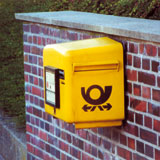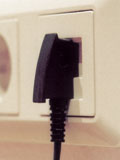Post Offices and Telecommunications
Letters, Parcels and Postage

The price for sending letters and parcels depends on size and weight. The German term used for the costs is "Porto". Stamps are available at all post offices, at vending machines outside post offices and in some newsagents or tobacco stores. Every address in Germany has a five-digit "postcode", which defines the village, city or local area. All postcodes are listed in the postcode directory ("Postleitzahlenbuch"), which is available at all post offices. Once a year the new local phone directory and Yellow Pages are issued by the German postal service ("Deutsche Post").
Almost all items sent by post have to be stamped – whether they are postcards or parcels. If the words "Porto zahlt Empfänger" are written on the envelope, then no stamp is needed as the recipient agrees to pay for the postage. A list of postage costs is available at all post offices. The "Deutsche Post" is the postal company most used by private customers in Germany. There are, however, other companies that also deliver letters and parcels.
![]() A list of these companies can be found in the Yellow Pages ("Gelbe Seiten") phone directory under "Kurierdienst", or "Paketdienst".
A list of these companies can be found in the Yellow Pages ("Gelbe Seiten") phone directory under "Kurierdienst", or "Paketdienst".
As before, however, the Deutsche Post AG continues to hold the exclusive rights for most of the postal market (until 31st December 2007).
Particularly important letters or documents can be registered when sent by post. The recipient must sign for the letter before it is delivered. This is called "Einschreiben" in Germany and can be undertaken at any post office.
Telephone, Fax, Internet

There are two ways to make phone calls in Germany: By using a landline ("Festnetz") or by using a mobile or cell phone. The landline is the phone line within the home, which can be used to make phone calls, send or receive faxes or go on the Internet.
Most homes already have a phone line installed. To use the phone line it is necessary to register with the phone company. The telephones themselves can be bought outright or rented from the phone company.
Digital connections such as ISDN or DSL give the consumer a number of phone lines, which can be used at the same time, for instance to make phone calls, use the fax machine and go on the Internet. More than one phone or computer can be connected. An ISDN / DSL connection is more expensive than an analogue connection, but ISDN and DSL transfer data faster and more effectively and are a great advantage if the Internet is used on a regular basis.
There are a number of offers to choose from depending on the individual needs of each customer: Do you make a lot of long distance calls or use the phone mainly at the weekends and in the evenings? If the Internet is used on a regular basis then maybe a "flat rate" would be less costly. The best and most cost-effective offer for your needs can be found at consumer advice centres or on the Internet (![]() www.billiger-surfen.de).
www.billiger-surfen.de).
There is such a vast range of "telephone rates" in Germany it is often described as a "Tarifdschungel" (rates jungle). The website ![]() www.billiger-telefonieren.de gives an overview of rates and conditions. The biggest German telephone company is "Deutsche Telekom". A line can be ordered from "Deutsche Telekom" and then changed at any time after a short period of notice. "Deutsche Telekom" shops can be found in all German cities. They are called "T-Punkt" stores.
www.billiger-telefonieren.de gives an overview of rates and conditions. The biggest German telephone company is "Deutsche Telekom". A line can be ordered from "Deutsche Telekom" and then changed at any time after a short period of notice. "Deutsche Telekom" shops can be found in all German cities. They are called "T-Punkt" stores.
Telephone numbers within your area of residence can be found in the local phone books or from directory enquiries (see chapter ![]() Directory Enquires). You can also find the dialling codes for long distance calls to other German areas. Telephone calls to mobile phones start with the digits 017 or 016.
Directory Enquires). You can also find the dialling codes for long distance calls to other German areas. Telephone calls to mobile phones start with the digits 017 or 016.
The call-by-call system can be cheaper than regular telephone calls. To use the call-by-call system a special dialling code is needed. The charges for the phone call are then paid to that specific telephone company. The cost of the call depends on the rates charged by that phone company. Costs of each individual company are listed on the Internet. Addresses:
![]() www.teltarif.de
www.teltarif.de
![]() www.billiger-telefonieren.de
www.billiger-telefonieren.de
Most telephone calls abroad can be made from your own telephone. First the digits 00 must be dialled, then the country code, the local dialling code (without the initial 0) and then the number itself. You can find out what the country code is from directory enquiries. There are numerous telephone shops in Germany that also offer you the possibility of making world-wide phone calls at reasonable rates. There are also special phone cards for foreign calls, which can be used from any telephone. Whether you use telephone shops, telephone cards or the call-by-call system, one thing is important to note: check the cost per minute of making calls and be sure to check if there is a one-off connection fee.
Mobile Phones
Mobile phones in Germany are usually referred to as "Handys". There are a number of companies that have different prices, phones and conditions. Unlike most landline operators, contracts with mobile phone providers cannot be terminated at short notice. Contracts normally run for 12 or 24 months.
Consumers also have the possibility of buying "prepaid telephone cards". These cards can then be used to make phone calls as long as there is credit on the card or until more money has been put on the card. No basic fee is paid using this system but call costs are higher. The prepaid card is placed in the mobile telephone.
Telephone Boxes
Alongside private landlines and mobile phones, public telephone boxes are also readily available. Telephone cards ("Telefonkarten"), credit cards or coins are used to make calls. The phone cards can be purchased in post offices, newsagents and kiosks.
Directory Enquires

Telephone and fax numbers can be found in telephone directories or by calling directory enquiries. The number for the "Deutsche Telekom" information service (“Telekom Auskunft”) is 11833; the information for foreign numbers (“Auslandsauskunft”) is 11834. A service in Turkish can be reached at 11836, and 11837 is in English. Another company offers an information service under the number 11881. Telephone numbers can also be found using a mobile phone (the number here is also 11881). Information is charged at different rates. CD-Roms with the majority of all telephone numbers in Germany are available and can be used on all computers with a disc drive. There are also a number of companies that offer this service. The website ![]() www.telefonbuch.de also has a listing of phone numbers. The current cheapest telephone information numbers are listed on the website.
www.telefonbuch.de also has a listing of phone numbers. The current cheapest telephone information numbers are listed on the website. ![]() www.tariftip.de.
www.tariftip.de.
The printed telephone directories contain the majority of numbers in any particular region. Commercial numbers and addresses are listed in the "Yellow Pages" ("Gelbe Seiten"). Both books can be found at post offices.
Internet
To use the Internet you have to be registered with a provider. Computer magazines often offer information on a regular basis on various national and international providers. The Internet software from these providers is generally free. There are also a number of regional providers. Computer shops can often provide valuable information.
Service Numbers
Many companies have what are described as "Hotlines", "Info-Lines", and "Info-Numbers" that offer telephone advice. These calls are often more expensive than "normal" phone calls. More information on the costs of service numbers is provided at ![]() www.regtp.de.
www.regtp.de.
